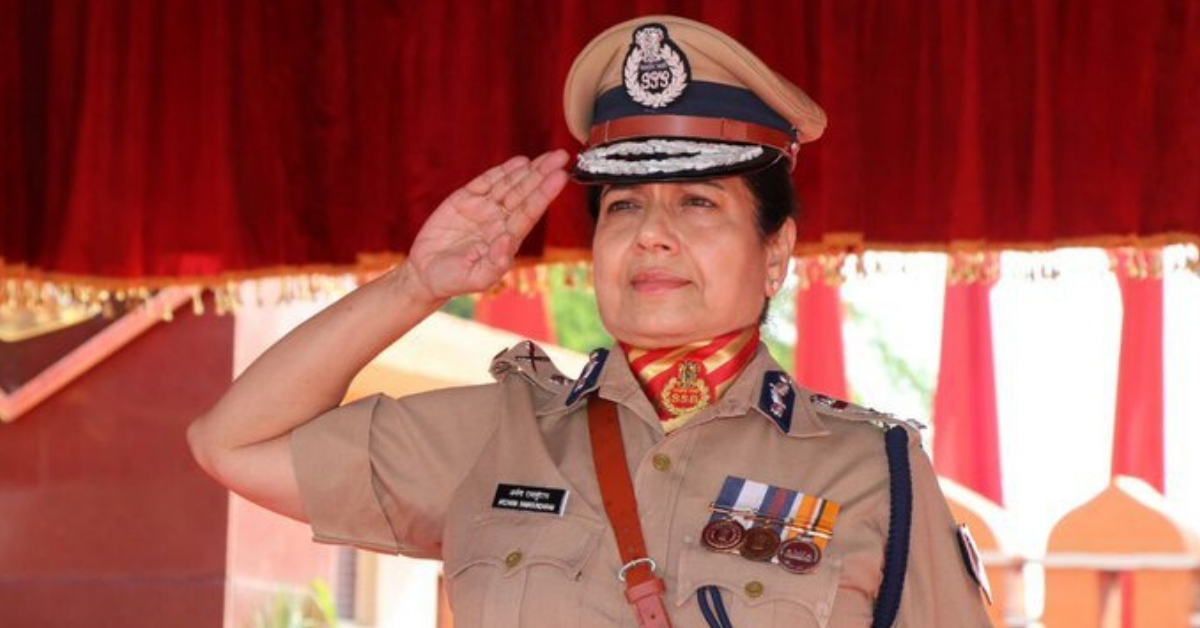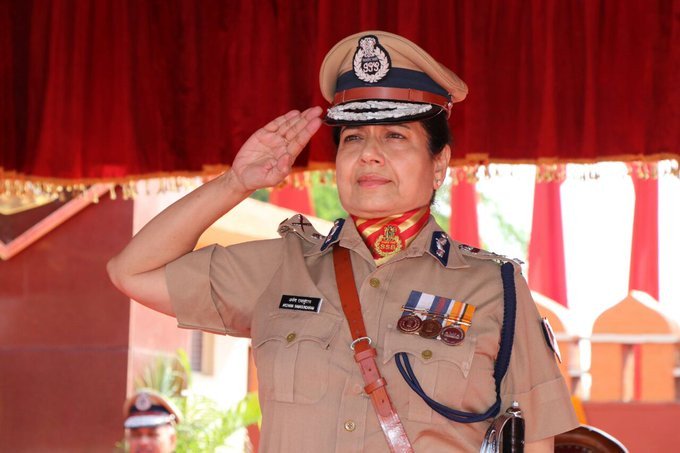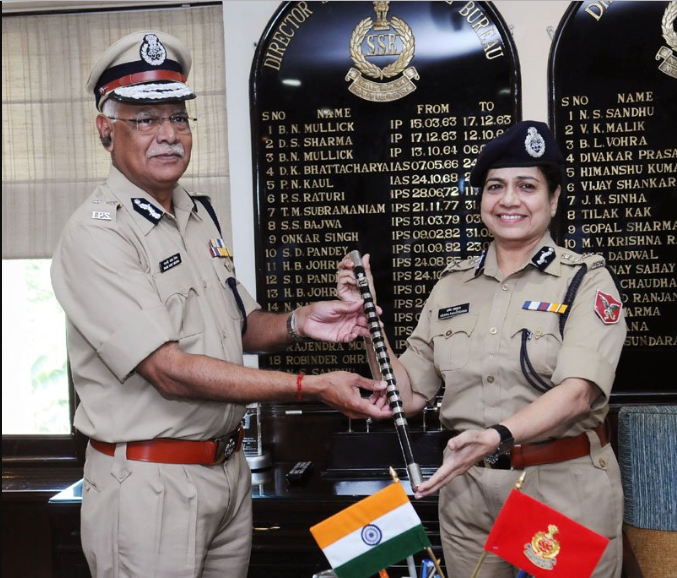Meet the IPS Officer Who Made History as India’s First Woman to Head a Paramilitary Force!
From being the only woman in her class when she joined the Hyderabad Police Academy to becoming a trailblazer for women officers, this is IPS Archana Ramasundaram’s story.

On February 3, 2016, top cop Archana Ramasundaram created history by becoming the first woman to head a paramilitary force in India in over 60 years.
She assumed charge as the Director General, Sashastra Seema Bal (SSB), which guards the 1,751-km Indo-Nepal and 699-km Indo-Bhutan borders. As SSB Chief, she was entrusted with the responsibility of not only building a sense of security for the people living in the border areas but also tackling trans-border crimes.
From being the only woman in her class when she joined the Hyderabad Police Academy to becoming a trailblazer for women officers, this is IPS Archana Ramasundaram’s story.

In an interview with DD’s popular talkshow Tejasvini, she recalled her childhood in a middle-class family in Eastern Uttar Pradesh’s Ballia district.
“At a time when education was a distant dream for girls, my father not only encouraged me to pursue it but also gave me the confidence to find my footing in an unconventional profession.”
The man who retired as a judge often interacted with cops, which instilled in him a love for the uniform. This love was passed down to a young Archana too.
She was an all-rounder right from school who knew she wanted to become an IAS or IPS officer.
“I knew I did not want a job where all I cared about was the monthly paycheck. I truly wanted to make a difference,” she said on Tejasvini.
A post graduate in Economics from the University of Rajasthan, she also worked as a lecturer for a brief period before she cleared her Union Public Service Commission exam.
She recalls the struggle of juggling work and the preparation for the competitive exams. After clearing the exam, she was appointed to the Indian Police Service and allotted the Tamil Nadu Cadre.
“When I joined the Hyderabad Police Academy, I was the only woman in my batch. I was nervous and awkward too at times. But the support of my batchmates, as well as the training staff, helped dispel all doubts. It’s been more than three decades, but still, our batch is a like a close-knitted family.”
She took a two-year study leave between 1989-91 when she completed her Master of Science in Criminology from the University of Southern California, USA.
Speaking about the challenges of serving in the Tamil Nadu cadre, miles away from her home state in the north, she says, “Language was a barrier, Tamil is a very difficult language to learn. But training and the state language exams that officers have to give, helped me overcome that barrier.”
She further talks about the unprecedented respect and support she received from the people of the state.
“During the course of my district training in the rural areas of Madurai, Vellore, Nilgiris, I was moved by the high regard villagers held women in. My gender became an advantage for me. When there was a law-and-order issue, there was a higher chance of the public listening to me than my other male counterparts.”
When asked if she was discriminated against when she first joined the service, she says, “I think when you join a service as a newly-appointed officer, no matter what your gender, your seniors find it difficult to entrust you with responsibilities. But over time you build that trust by performing. I have always believed that leadership is more important than gender. And working in the force is all about teamwork.”
If you were to listen to the top cop speak, you would be pleasantly surprised at her soft-spoken personality. When asked if she is told that she doesn’t fit the stereotypical Dabbang image of uniformed officials, she smiles saying, “Our personal identity doesn’t change with the career we choose. As far as my soft-spokenness is concerned, it has never been a roadblock in my performance or discharge of duties. When one’s got to be tough, you adapt to that situation as well!”
From striking down bootleggers and prohibition offenders as SP of Vellore to leading the team that probed the Rs 20,000-crore Abdul Karim Telgi fake stamp paper scam, she rightfully earned the Police Medal for Meritorious Services in 1995 and the President’s Police Medal for her distinguished service in 2005.
From 1999 to 2006, she served the Central Bureau of Investigation at New Delhi in various capacities and handled several important cases.
Her appointment as the CBI chief in May 2014 made headlines when the Jayalalitha-led Tamil Nadu government suspended her, alleging that she had taken up the post without being relieved of her duties by the state government. The matter was taken to the Supreme Court which restrained her from discharging her duties.
It was a tumultuous time for the chief, who then spent months in the CBI without any substantial work before she was asked to head the National Crime Records Bureau.
Nonetheless, she became a trailblazer for women in the force by becoming the first woman to lead any Central Armed Police Force which includes the CRPF, BSF, ITBP, CISF and the SSB. When asked what she feels about her much-talked-about title, she pointed out how headlines only emphasised her gender when her posting came.
In an interview on NDTV’s show Agenda, she asked,
“It shouldn’t matter, but it does. The last chief BD Sharma was my batchmate, so why is it strange that I should get his place three years later?”

In another interview, she added how she never looked at men and women serving in the force differently, and her appointment was a result of her hard work, performance, and merit.
According to an India Today report, her term as chief of the SSB saw the force rescue 503 victims and arrested 147 traffickers in 2016, while 472 victims were rescued and 132 traffickers detained in 2017.
In addition, between 2016-2017 the force ensured the surrender of 51 Naxals, seizing 125 weapons, 1,372 ammunition, 135 kgs of explosives, 64 kgs of IED (Improvised Explosive Device) from them.
“Our attempt is to maintain people-friendly borders but we have to ensure that undue advantage is not taken of open, porous borders. Trans-border crimes are a challenge, and the force has carried out rescue work on a large scale. We also speak to victims who reveal a lot about such traffickers. We organise theatre sessions for and by children (as counselling and awareness measures),” she told India Today.
She adds how family support is important in her line of duty. “Our service is very different from other forces because of the odd hours, so family support becomes very important. Whether I was serving as the district SP or the range DIG, whenever duty calls happened at odds hours, my husband would support me.”
Read More: Exclusive: Meet Tanu Shree Pareek, BSF’s First Woman Combat Officer In 51 Years
She emphasises the lower representation of women which is a meagre 3% in a 78,000-strong force. But she adds how changes in recruitment policy and improvement of working conditions can help increase the numbers.
On the talk show Tejasvini, when she was asked about the rising crime against women and where the Indian Police Force lagged in creating a safe environment for them, her reply was a thought-provoking one.
“Women are still objectified. The mindset of people hasn’t shifted. And while I understand that it is the duty of the force to create a safe environment where not just women but men too feel safe, it would be wrong to call women’s safety only a police issue. It is a very narrow way of looking at it. Not just as an officer, but also as a woman, I feel it is the responsibility of us as a society to build a safer atmosphere for women,” she signed off.
The top cop retired after an illustrious 37-year career, passing the reins of the SSB force to senior IPS officer Rajni Kant Mishra on September 31, 2017.
(Edited by Shruti Singhal)
Like this story? Or have something to share?
Write to us: [email protected]
Connect with us on Facebook and Twitter.
If you found our stories insightful, informative, or even just enjoyable, we invite you to consider making a voluntary payment to support the work we do at The Better India. Your contribution helps us continue producing quality content that educates, inspires, and drives positive change.
Choose one of the payment options below for your contribution-
By paying for the stories you value, you directly contribute to sustaining our efforts focused on making a difference in the world. Together, let's ensure that impactful stories continue to be told and shared, enriching lives and communities alike.
Thank you for your support. Here are some frequently asked questions you might find helpful to know why you are contributing?


This story made me
-
97
-
121
-
89
-
167














